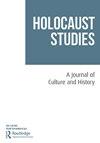Massacre of the Innocents: creating a Holocaust memorial libretto
IF 1
Q1 Arts and Humanities
引用次数: 0
Abstract
ABSTRACT Part I of the article looks at the challenge of writing Holocaust poetry and music in the light of Adorno’s revision of his famous pronouncement about poetry after Auschwitz into an acknowledgment that suffering ‘demands the continued existence of art while it prohibits it,’ and goes on to consider how the poets Paul Celan, Karen Gershon, Geoffrey Hill, Primo Levi, Sylvia Plath, Peter Porter, Nelly Sachs and Hilda Schiff, and the composers Harrison Birtwistle, David Lumsdaine, Steve Reich and Arnold Schoenberg make use of their personal distance from their subject matter as they attempt to create art out of atrocity. Part II discusses how the historical source material of the author’s libretto in memory of the child victims of the Holocaust was crafted into the musical forms of recitative, lieder, lullaby and biblical lament.无辜者的屠杀:创建一个大屠杀纪念剧本
摘要本文的第一部分从阿多诺在奥斯威辛集中营后对其著名的诗歌宣言的修订来看了创作大屠杀诗歌和音乐的挑战,他承认苦难“要求艺术在禁止它的同时继续存在”,并继续思考诗人保罗·策兰、凯伦·格申、杰弗里·希尔、普里莫·李维、西尔维娅·普拉斯,彼得·波特(Peter Porter)、内莉·萨克斯(Nelly Sachs)和希尔达·希夫(Hilda Schiff。第二部分论述了作者纪念大屠杀受害儿童的歌词的史料是如何被提炼成朗诵、抒情、摇篮曲和圣经哀歌等音乐形式的。
本文章由计算机程序翻译,如有差异,请以英文原文为准。
求助全文
约1分钟内获得全文
求助全文

 求助内容:
求助内容: 应助结果提醒方式:
应助结果提醒方式:


